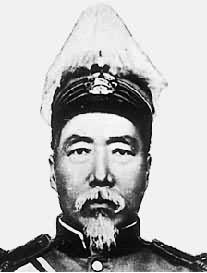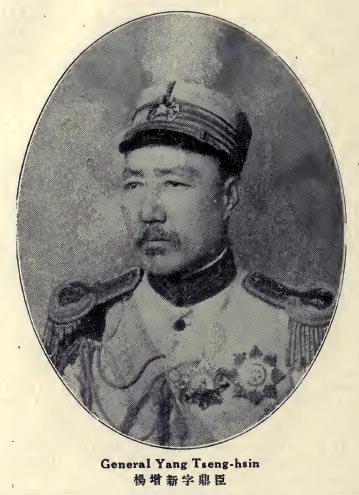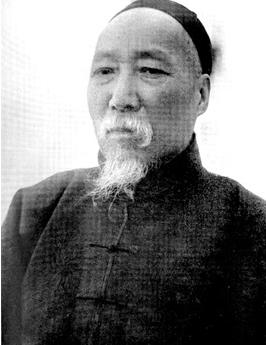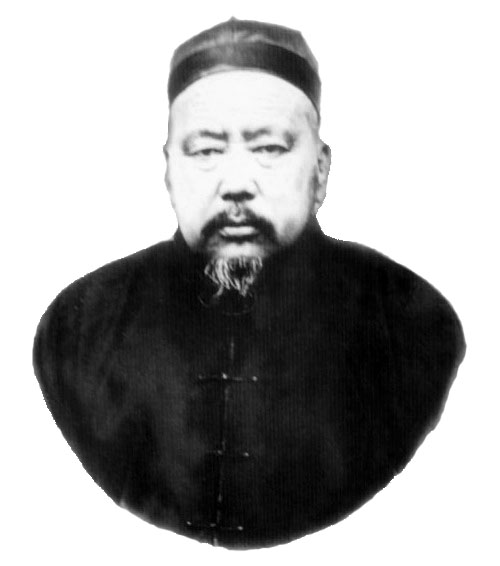<Back to Index>
- Governor of Xinjiang Yang Zengxin, 1859
- Governor of Qinghai Ma Qi, 1869
PAGE SPONSOR



Yang Zengxin (simplified Chinese: 杨增新; traditional Chinese: 楊增新) (1859 - July 7, 1928), born in Mengzi, Honghe, Yunnan in 1859, was the ruler of Xinjiang after the Xinhai Revolution in 1911 until his assassination in 1928.
Yang Zengxin, a Han Chinese, had connections with the leading Muslim families of Yunnan. He was an expert in Islam and Islamic culture. Hezhou Prefecture Magistrate Yang Zengxin wrote an essay on Sufi menhuan dated 1897.
Ma Yuanzhang, a Sufi Jahriyya Shaykh, gave his support for Yang Zengxin to seize power in Xinjiang. This enabled Yang to immediately raise a massive army of Hui Muslim troops, mainly from Jahriyya mosque communities.
The Muslim General Ma Anliang, in cooperation with magistrate Yang Zengxin, attempted to arrest and execute the Yihewani (Ikhwan in Arabic) leader Ma Wanfu. Ma Qi, one of Ma Anliang's subordinates, staged a rescue operation and brought Ma Wanfu to Xining. Ma Anliang and Yang Zengxin were both monarchists and did not trust republicanism, they had served in the Qing military together.
Yang came to power after he defeated the revolutionaries that caused the last Qing dynasty governor Yuan Dahua to flee during the Xinhai Revolution in Xinjiang. The Ili revolutionaries and the Gelaohui were eliminated by Yang. Yang appointed Ma Fuxing as military commander of 2,000 Chinese Muslim troops, to crush Yang's rivals. President Yuan Shikai recognized his rule and in return he supported Yuan's revival of the monarchy by inviting Republican anti - Yuan rebels to a banquet and decapitating them on New Year's Day, 1916. Yang believed monarchy was the best system for China, and some western travelers noted with approval, that Yang was a former Mandarin unlike the Republican governors of the other provinces.
Yang was made a Count of the First Rank (一等伯 Yī děng bó) by Yuan Shikai.
In 1917, President Li Yuanhong assigned Fan Yaonan (樊耀南) to observe him and, if possible, replace him. Yang always recognized which ever faction was in power in the Beiyang government to avoid trouble. Yang's rule kept the region relatively peaceful, compared to other parts of China which were war - torn. However, he ruled dictatorially and executed many dissidents. Taxes for Kazakhs, Uighurs, and other minorities were lowered. People were forbidden to abuse minorities, and warned his Muslim subjects on the Soviet Russians to "beware of associating themselves with a people who are entirely without religion and who would harm them and mislead their women".
Yang relied heavily on Hui people, Chinese Muslims to enforce his rule on Xinjiang. They were disliked by both Han and Uighurs, because they had high positions within the Xinjiang military and government under Yang.
There were several Uighur factions during Yang's rule in Xinjiang, which did not intermarry and were fierce rivals. The Agtachlik faction always cut off the top of a melon and said bismillah before slicing it, and the less pious Qarataghliks (black mountain Uighurs) would slice up the melon without invoking the name of God. The Qarataghliks were pro - Chinese, and content to live under Chinese rule, while the Agtachlik Uighurs were hostile to Chinese rule.
On July 1, 1928 he recognized the Nationalist Government in Nanjing. Six days later he was killed in a coup attempt by Fan Yaonan during a banquet. Fan had risen high into Yang's regime but Yang never trusted Fan. The motive seems to be Yang's denial of the pro - Nationalist Fan into a Nationalist advisory council designed to keep Xinjiang in check. Yang's death was avenged by Jin Shuren almost immediately. Lacking resources to oust Jin, Nanjing recognized his succession to the governorship.
Ma Fuxing was appointed Titai of Kashgar from 1916 - 1924 by Yang, who ordered Ma Shaowu to assassinate Ma Fuxing in 1924. Ma Shaowu was then appointed Daotai of Kashgar.
The
third reason is that at the time that Turkic Muslims were waging
rebellion in the early years of the Guangxu reign, the ‘five elite
divisions’ that governor general Liu Jintang led out of the Pass were
all Dungan troops [Hui dui 回队]. Back then, Dungan military commanders
such as Cui Wei and Hua Dacai were surrendered troops who had been
redeployed. These are undoubtedly cases of pawns who went on to achieve
great merit. When Cen Shuying was in charge of military affairs in
Yunnan, the Muslim troops and generals that he used included many
rebels, and it was because of them that the Muslim rebellion in Yunnan
was pacified.

Ma Qi (1869 – August 5, 1931) (simplified Chinese: 马麒; traditional Chinese: 馬麒) was a Chinese Muslim warlord in early 20th century China.
His grandfather Sa-la Ma (马撒拉), is a Salar. He was born in 1869 in Daohe, now part of Linxia, Gansu, China. His father was Ma Haiyan. He was senior commander in the Qinghai - Gansu region ever since the late Qing times.
Ma Qi led loyalist Muslim troops to crush Dungan rebels during the Dungan Revolt (1895).
During the Boxer Rebellion, Ma Haiyan defeated the foreign army at the Battle of Langfang, and died in 1900 while protecting the Imperial Family from the western forces. Ma Qi succeeded him in all his posts and capacities. Ma Qi was six feet tall, and maintained the mintuan militia in Xining as his personal army, called the Ninghaijun.
Ma Qi also directly defied his commanding officer, the Muslim General Ma Anliang, when Ma Wanfu, the Muslim brotherhood leader, was being shipped to Gansu from Xinjiang by Yang Zengxin, to Ma Anliang, so Ma Anliang could execute Ma Wanfu, Ma Qi rescued Ma Wanfu by attacking the escort and brought him to Qinghai. Ma Anliang hated Muslim brotherhood, which he had banned earlier, and had sentenced all its members to death, and wanted to personally execute Ma Wanfu because he was its leader.
During the Xinhai Revolution, Ma Qi easily defeated Gelaohui revolutionaries in Ningxia, sending their heads rolling, but when the Emperor abdicated, Ma Qi declared support for the Republic of China. Unlike the Mongols and Tibetans, the Muslims refused to secede from the Republic, and Ma Qi quickly used his diplomatic and military powers to make the Tibetan and Mongol nobles recognize the Republic of China government as their overlord, and sent a message to President Yuan Shikai reaffirming that Qinghai was securely in the Republic. He replaced "Long, Long, Long, Live the reigning Emperor", with "Long live the Republic of China" on inscriptions.
Ma Qi developed relations with Wu Peifu, who tried to turn Gansu military leaders against Feng Yuxiang.
Feng's subordinate, Liu Yufen expelled all the Han Generals who
opposed him, which resulted in Hui Generals Ma Hongbin, Ma Lin, Ma
Tingxiang, and Han General Bei Jianzhang, the commander of a Hui army, to
stop fighting against Feng and seek an agreement.
Ma Qi formed the Ninghai Army in Qinghai in 1915.
Ma Qi occupied the Labrang monastery in 1917, the first time non Tibetans had seized it.
After ethnic rioting between Muslims and Tibetans emerged in 1918, Ma Qi defeated the Tibetans. He heavily taxed the town for 8 years. In 1925, a Tibetan rebellion broke out, with thousands of Tibetans driving out the Muslims. Ma Qi responded with 3,000 Chinese Muslim troops, who retook Labrang and machine gunned thousands of Tibetan monks as they tried to flee. Ma Qi besieged Labrang numerous times, the Tibetans and Mongols fought against his Muslim forces for control of Labrang, until Ma Qi gave it up in 1927.
Ma Qi defeated the Tibetan forces with his Muslim troops. His forces were praised by foreigners who traveled through Qinghai for their fighting abilities.
However, that was not the last Labrang saw of General Ma. Ma Qi launched a genocidal war against the Tibetan Ngoloks, in 1928, inflicting a defeat upon them and seizing the Labrang Buddhist monastery. The Muslim forces looted and ravaged the monastery again.
After the founding of the Republic he was governor of Qinghai from 1915 to 1928 and the first chairman of the government of Qinghai from 1929 to 1931. After Chiang Kai-shek gained control nationwide, he became a brigade commander, and then was promoted to commander of the 26th Division of the National Revolutionary Army in the northwestern region. His civil posts also included director of the Gansu Bureau of Construction. Ma Qi is the father of Ma Bufang and Ma Buqing, uncle of Ma Zhongying and he died on August 5, 1931, in Xi'an, Shaanxi, China.